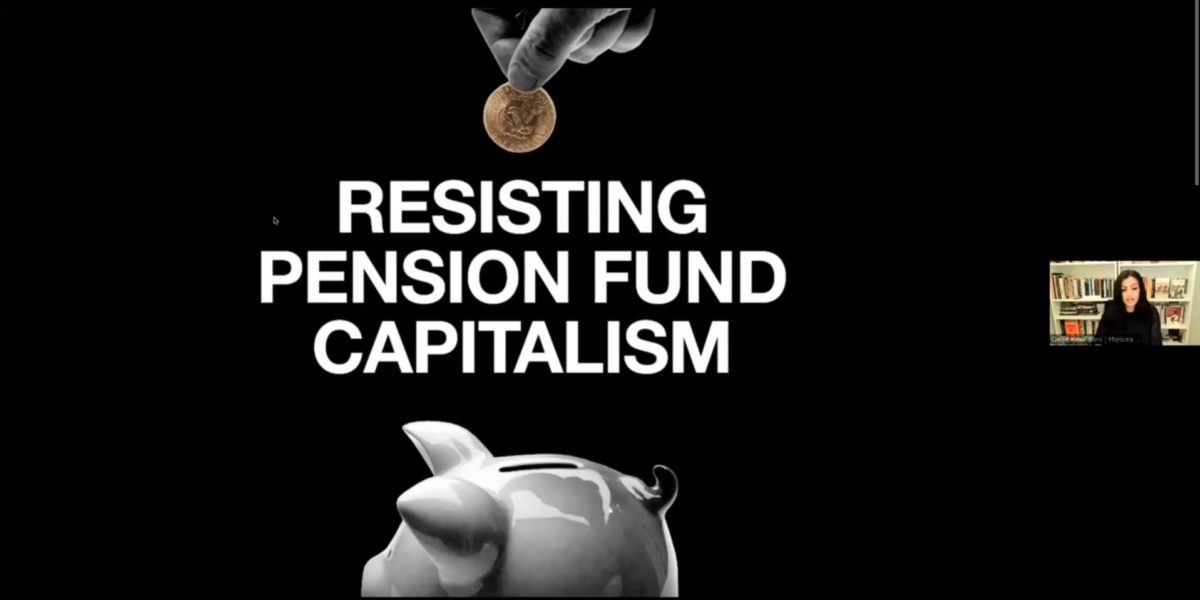I am always on the lookout for instructive or interesting material for this column, and recently I came upon informative presentations that I have to share. During the pandemic use of public pension fund moneys has been under increasing scrutiny, both in terms of the impact these funds are having on land concentration and the loss of family farms around the world, but also on the impact on health systems and more.
The two webinars on pension investment funds follow-up on columns which I wrote last year related to our pension moneys and how their use is impacting both urban and rural communities here in Canada and around the world.
Grain, a small international non-profit which supports family farmers, social movements, and food systems, is hosting a series of two webinars titled “Resisting Pension Fund Capitalism.” The first is an overview of pension fund investing globally, as it relates to the impacts on agriculture and much more. This webinar is revealing and disturbing in many ways.
Since the economic collapse of 2008, pension funds have been seeking to park their assets in what are considered more stable investments that promise good returns. Of course, the inadequate government funding for public pensions in Canada goes way back to the late 1980s as a key issue.
All that to underscore that for-profit management of pension investment funds has grown in leaps and bounds here in Canada and elsewhere in the world. Pension fund investments now makeup one of the largest pools of investment capital globally. Of the estimated US$ 250 trillion in investment assets on the global market today, more than US$ 56 trillion is controlled by pension investment funds from 22 countries.
This Grain webinar incorporates a lot of research. The first webinar presents a detailed presentation by Kevin Skerett, a Senior Researcher with the Canadian Union of Public Employees and an adjunct professor with the University of Carleton’s Institute of Political Economy.
In his presentation Skerett notes that of the 22 countries with pension asset investments, seven are considered to be the largest holders — the US, UK, Japan, Australia, Netherlands, Canada and Switzerland. Skerett also notes that Canada’s model of investment — the pooling of pension investment funds — is being exported and internationalized, and essentially adopted by other pension investment funds world wide.
That’s a very sad note for those of us who like to believe that public and worker pension funds, and the practice of pooling resources, can have a positive impact. In this case, the pool modelling tailored in Canada is not to support communities here, or to aid or to provide help elsewhere, but instead the model is encouraging destructive practices that are negatively impacting on everything from climate change through oil and gas investments, the privatization of education, healthcare, landgrabbing and land concentration, privatization of water, and what is increasingly being called the financialization of food systems.
Essentially the pension fund premiums that we pay through our unions (if we are lucky enough to be unionized) or through our government-run public pension, (the Canada Pension Plan-CPP), are tying us into what can at be best termed a shady system of investments based on growth at all costs. Investments that are being made by “stealth” according to Skerett, who notes that workers, who have placed their moneys into these pension funds, know little about the damaging ways that their moneys are actually being used.
Research continues to reveal stacks of information that is leading to more and more links regarding how worker and public pension funds are actually being invested in predatory and destructive ways.
One example cited by Skerett during the Grain webinar is the privatization of a public water company CEDAE in Brazil. The Canada Pension Plan Investment Board along with Alberta-based pension fund AIMCo bought the Brazilian public company in April of 2021 – essentially privatizing water — much to the pleasure of current right-wing Brazilian President Bolsonaro, who attended the launch of the new corporate entity called Iguá Sareamento. The privatization of what was once a profitable and well-administered public utility is impacting 30 municipalities and more than 13 million people in the state of Rio de Janeiro, and more of this type of privatization is on the horizon.
During the past year, rabble has carried two my columns on the role of pension fund investments in industrializing everything from agricultural lands to long-term care homes. From Food to Frailty documents pension fund investments in farmland as well as the role of long-term care corporation REVERA and its ownership by worker pension funds. The column also notes how workers unionized by the Public Service Alliance of Canada (PSAC).
REVERA along with the Canadian Health Coalition are calling for the federal government to nationalize REVERA.
The rabble column of March of 2021 notes how Canadian pension funds are actually investing in corporations that are clearly working to undermine Canadian prairie farmers and family farmers and their communities more generally. And, as the research presented by Grain shows, the impact goes beyond Canada, beyond agriculture, and beyond long-term care homes.
The second webinar in this series organized by Grain is scheduled for June 9th — and the goal is to strategize on ways of deterring these predatory pension fund investments from using moneys that really should be considered public funds. These funds are, afterall, comprised of the pension premiums of working people across our country!
It is well worth tuning in here.




